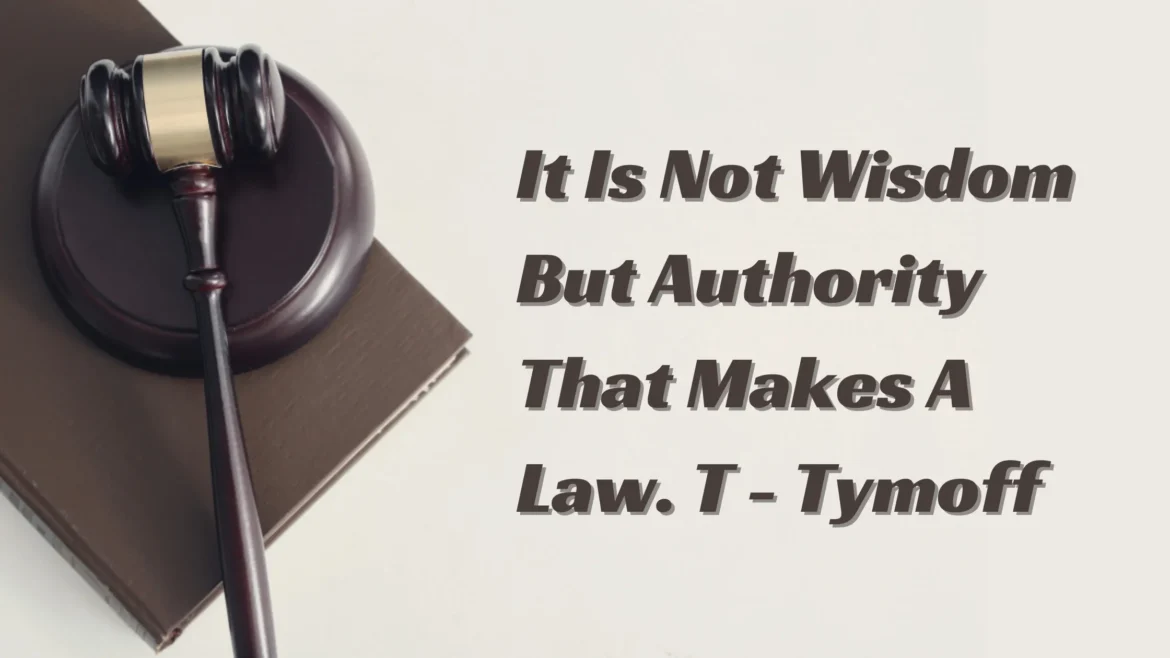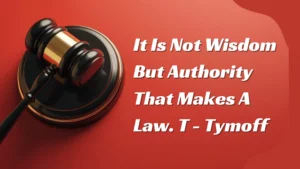
Introduction to It Is Not Wisdom but Authority That Makes a Law – T. Tymoff
The quote, “It Is Not Wisdom but Authority That Makes a Law – T. Tymoff, is a profound statement on the nature of law and governance. It highlights the reality that laws are often enacted not necessarily because they are the wisest or most ethical decisions, but because they have the backing of authority. This distinction between wisdom and authority is fundamental to understanding how legal systems function across the world. Laws, as we know them, are rooted in power structures that enforce them, often prioritizing control over moral or intellectual superiority.
The Nature of Law A Product of Authority
Laws are the foundational structures that govern societies, dictating the boundaries of behavior, the distribution of resources, and the consequences of non-compliance. In an ideal world, laws would always reflect wisdom, justice, and the collective good. However, as the quote by It Is Not Wisdom but Authority That Makes a Law – T. Tymoff suggests, the reality is that laws are more often a reflection of the authority that enforces them rather than the wisdom that inspires them. Authority, in this context, refers to the power vested in governments, monarchs, or ruling bodies to create, enforce, and uphold laws. This power is what gives laws their binding nature.
Historical Examples Authority Over Wisdom
Throughout history, there have been numerous examples where It Is Not Wisdom but Authority That Makes a Law – T. Tymoff were enacted not because they were wise or just but because those in power deemed them necessary to maintain control. In many cases, these laws have been controversial, oppressive, or outright harmful to certain groups. Similarly, during the apartheid era in South Africa, laws were enacted that segregated the population based on race. These laws were enforced by a powerful minority government, despite being morally and ethically indefensible.
The Role of Wisdom in Lawmaking
It Is Not Wisdom but Authority That Makes a Law – T. Tymoff, wisdom plays an equally important role in ensuring that those laws are just, fair, and beneficial to society as a whole. A wise law considers the long-term effects on a population, promotes justice, and aligns with ethical principles. Wisdom, in this sense, is the moral compass that should ideally guide the creation of laws, ensuring they serve the greater good rather than the interests of the powerful. However, wisdom often takes a backseat to authority in lawmaking.
The Balance Between Authority and Wisdom
 The relationship between It Is Not Wisdom but Authority That Makes a Law – T. Tymoff is complex and often contentious. Ideally, authority should be exercised in a way that reflects wisdom, ensuring that laws serve the public good, promote justice, and protect individual rights. However, in practice, authority often dominates, leading to laws that may prioritize control, order, or the interests of the few over the many. Similarly, legislative bodies are expected to incorporate wisdom into the lawmaking process by engaging in debates, consulting experts, and considering the long-term consequences of laws.
The relationship between It Is Not Wisdom but Authority That Makes a Law – T. Tymoff is complex and often contentious. Ideally, authority should be exercised in a way that reflects wisdom, ensuring that laws serve the public good, promote justice, and protect individual rights. However, in practice, authority often dominates, leading to laws that may prioritize control, order, or the interests of the few over the many. Similarly, legislative bodies are expected to incorporate wisdom into the lawmaking process by engaging in debates, consulting experts, and considering the long-term consequences of laws.
Authority in the Modern Legal Landscape
In today’s legal landscape, the It Is Not Wisdom but Authority That Makes a Law – T. Tymoff is typically vested in governmental institutions, such as parliaments, congresses, or assemblies. These bodies are composed of elected or appointed officials who are tasked with representing the interests of the people. However, even in democratic systems, the authority to make laws is not always exercised in a manner that reflects the wisdom or the best interests of all citizens. Additionally, laws related to national security or emergency powers often reflect the concentration of authority in the hands of a few.
The Ethical Implications of Authority-Based Laws
When It Is Not Wisdom but Authority That Makes a Law – T. Tymoff, they can lead to significant ethical dilemmas. Laws that are unjust or oppressive may be legally enforceable, but they can create moral conflicts for individuals and society. For instance, laws that discriminate against certain groups or suppress freedom of speech may be legal, but they are not ethical or just. Civil disobedience, as advocated by figures like Mahatma Gandhi and Martin Luther King Jr., often arises as a response to authority-based laws that lack wisdom or justice.
Can Authority and Wisdom Coexist?
The ultimate goal in any society should be to create a legal system where It Is Not Wisdom but Authority That Makes a Law – T. Tymoff coexist harmoniously. Laws should be created and enforced by those in power, but they should also be guided by wisdom, ensuring that they promote justice, equality, and the common good. This requires a legal framework that is transparent, accountable, and open to public scrutiny. Moreover, it requires leaders and lawmakers who are not only powerful but also wise—individuals who understand the long-term consequences of their decisions and who prioritize the well-being of society over personal or political gain.
The Role of Public Opinion in Shaping Law
Another critical aspect in the intersection of It Is Not Wisdom but Authority That Makes a Law – T. Tymoff is the influence of public opinion. In democratic societies, laws are often shaped by the views and demands of the population. Public opinion can pressure lawmakers to enact or repeal laws, especially when there are widespread movements advocating for change. While this may seem like a way to introduce wisdom into the process, it can also lead to hasty decisions that prioritize popularity over long-term benefits.
Conclusion
It Is Not Wisdom but Authority That Makes a Law – T. Tymoff speaks to a fundamental truth about the nature of lawmaking. While authority is necessary to enforce laws and maintain order, wisdom is essential to ensure that those laws are just, fair, and beneficial to society. In an ideal world, authority and wisdom would go hand in hand, creating laws that reflect both the power to govern and the moral insight to govern well. However, the reality is that authority often takes precedence, and it is up to society to continually strive for a legal system where wisdom plays a central role in the creation and enforcement of laws.
You May Also Read: Geekzilla Tio Geek
